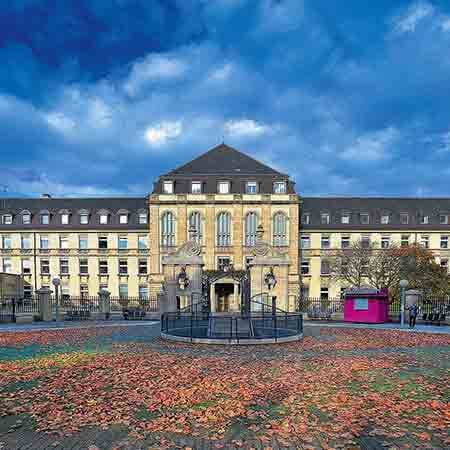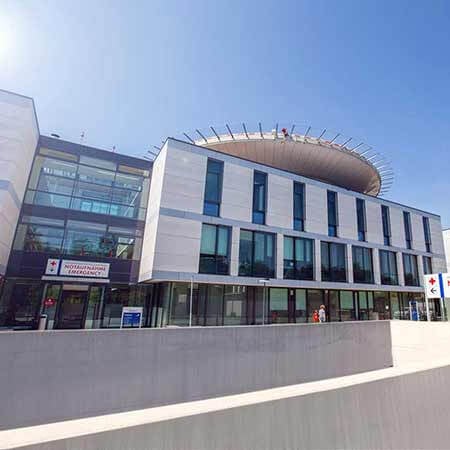Thyroid lymphoma is a rare malignant tumor of the organ. This neoplasm is dangerous because, when it reaches a large size, it can compress the airways, as well as other vital organs and anatomical structures of the neck. The disease is usually detected in its early stages and is successfully cured. In Germany, most cases of thyroid lymphoma can be cured, even when detected at an advanced stage. If you are going to have your treatment in this country, the Booking Health service will be very helpful. Here, you can compare the cost of treatment in Germany in different hospitals, and make your treatment appointment at the best price.
Content
- Principles of treatment
- Surgical treatment
- Radiation therapy
- Chemotherapy
- Immunotherapy
- Stem cell transplant
Principles of treatment
The main methods of thyroid lymphoma treatment in Germany are radiation therapy and chemotherapy. They can be used together or separately. Chemotherapy is often supplemented with immunotherapy.
Surgery is not among the main treatments for thyroid lymphoma in Germany. However, in some situations, doctors still resort to this treatment option, since the removal of tumor tissue allows them to quickly eliminate the symptoms associated with the compression of the respiratory organs by the enlarged thyroid gland.
Lymphoma can usually be cured with radiation therapy and chemotherapy, but if these methods are not enough, then doctors have other therapeutic methods in their arsenal, such as targeted therapy, immunotherapy, a stem cell transplant, and CAR T-cell therapy.
Surgical treatment
Surgical interventions for thyroid lymphoma treatment in Germany can be performed in the following cases:
- An unclear diagnosis. For example, if the doctor does not know exactly which disease he is dealing with: lymphoma or thyroid cancer. In such cases, the gland is completely removed, after which, the material is sent for a histological examination. The results of this examination allows doctors to confirm a diagnosis.
- Severe symptoms from the compression of the neck organs. If the tumor has become very large, compresses the respiratory organs, and threatens severe complications, it will be removed completely or partially.
- Contraindications to radiation therapy. At the early stage of thyroid lymphoma, systemic treatment is usually not required. The disease can be cured with local methods, and radiation therapy is considered the main option. But if this type of treatment is contraindicated, then surgery becomes an alternative option.
The extent of the surgical intervention depends on the purpose of the operation. If the doctor seeks to cure the lymphoma completely, then he will remove the entire thyroid gland. But usually, the operations are more sparing than those undertaken for cancer treatment. To achieve the goals of the surgical intervention, it is sufficient to remove only a part of the organ (a lobectomy or a subtotal resection), since the remaining tumor foci and malignant cells will be destroyed by postoperative radiation therapy or chemotherapy.
Radiation therapy
Radiation therapy is one of the main treatments for thyroid lymphoma. In other areas of oncology it is usually only as an additional method that improves the results of surgical operations. However, in cases of lymphoma it can be used as a standalone method that allows doctors to completely cure the disease at its early stage, even without the help of surgeons and without any chemotherapy.
Radiation therapy can be used in the following situations:
- as the main treatment method for the early stage of the disease;
- along with chemotherapy, for the treatment of advanced thyroid lymphoma;
- after surgery for tumor removal in order to minimize the risk of its recurrence.
Approximately 40% of patients receive radiation therapy, half of these treatments are postoperative radiation therapy. Basically, it is used at the early stage of the disease. The advanced stages of the disease, when the lymphoma has spread in the body, are often treated with medications.
Doctors in Germany use the very latest types of radiation therapy, which help them to safely and accurately irradiate the tumor without causing any significant lesions to the surrounding organs and tissues. This is especially important in cancer and lymphoma of the thyroid gland, as this area contains many critical organs, large blood vessels, and nerve endings. The esophagus, trachea, larynx, spine, and spinal cord are located in this area. It is important to direct the radiation to the tumor very accurately to avoid severe post-radiation complications. In Germany, the goals of the treatment are achieved with minimal lesions to the healthy tissues, as doctors use intensity-modulated radiation therapy, image-guided radiation therapy, and other advanced techniques. They provide not only reduced irradiation to the organs surrounding the lymphoma, but also a more uniform distribution of the dose inside the tumor, which increases the effectiveness of the therapy provided.
Chemotherapy
Most types of cancer cannot be cured with chemotherapy alone. When treating cancer, this is usually only an additional method of therapeutic action, which reduces the risk of tumor recurrence after surgery.
But lymphoma is an exception. Unlike cancer, this thyroid tumor is rarely operated on. Chemotherapy is used as the main, often the only, treatment method. Unlike chemotherapy for cancer, the use of the drugs for lymphoma is aimed at completely curing the disease.
Most patients with thyroid lymphoma receive chemotherapy. The exceptions are patients with the early stages of the disease who have undergone surgery and/or radiation therapy. The therapeutic regimen usually includes glucocorticoids, which help to quickly eliminate the symptoms associated with the compression of the neck organs by the tumor mass.
The chemotherapy regimen is selected individually, depending on the type of thyroid lymphoma. Diffuse large B-cell lymphoma is more common than others, while follicular or MALT lymphomas are less common. The thyroid gland can also be affected by other types of neoplasms, but they are very rare types of the disease.
In Germany, the treatment is usually started with the CHOP regimen, while a combination of CVP drugs is a less common option. Monoclonal antibodies have been increasingly included in the CHOP regimen in recent years. This mode is called R-CHOP. It demonstrates higher efficiency compared to the standard regimen.
Sometimes, first-line chemotherapy does not work, or the tumor recurs after its initial treatment. In such situations, other chemotherapy drugs may be used. German doctors also have in their arsenal many effective drugs for immunotherapy and targeted therapy, which help patients to cope with most cases of thyroid lymphoma.
Immunotherapy
In Germany, immunotherapy is considered the second most important medical treatment for thyroid lymphoma. Some drugs are prescribed as the first-line treatment, while other drugs are used when standard regimens are not effective enough.
CD20 monoclonal antibodies. The drugs in this group are often used in the R-CHOP regimen. They are usually injected intravenously over several hours. Germany has also begun to use more convenient forms of these drugs, which are injected subcutaneously in just a few minutes. These medications are relatively safe. They cause side effects, but rarely lead to any severe complications. CD20 antibodies increase the risk of hepatitis B virus activation, so patients are tested for this infection before starting their treatment.
CD19 monoclonal antibodies. These target the CD19 antigen, a protein on the surface of B-lymphocytes. It is often combined with immunomodulators. The drug is used to treat diffuse large B-cell lymphoma that has not responded to the standard therapy or has relapsed after its previous treatment, as well as in patients with contraindications to a stem cell transplant. Monoclonal antibodies are injected once a week for the first few months, and then once every two weeks.
Antibody-drug conjugates. These are a new type of drug that is used in Germany. The monoclonal antibody is combined with a chemotherapy drug. The antibody is used to deliver chemotherapy drugs to the cells containing CD19. Thus, the drugs act directly on the lymphoma cells, which increases the effectiveness of the therapy. The medication is used as third-line drug therapy for diffuse large B-cell lymphoma. It is administered intravenously, once every three weeks.
Immunomodulators. These drugs enhance the antitumor immune response. The mechanism of action has not been established, but some patients respond well to such a treatment. Immunomodulators are usually combined with monoclonal antibodies. They are used when other treatments have failed.
CAR T-cell therapy. This option can be used when other treatments do not work. The price of CAR T-cell therapy is high, but this technique helps to cure even the most severe and advanced cases of the disease. Doctors harvest immune cells from the patient's blood, change their genome, multiply them, and inject them back. These modified cells attack the tumor, thereby leading to a decrease in the size of the lymphoma foci or, to their complete disappearance.
Stem cell transplant
A stem cell transplant procedure can treat even the most severe cases of thyroid lymphoma that do not resolve with standard therapy or a case that has recurred after its initial treatment.
The transplant options are as follows:
- an autologous transplant, which involves the use of the patient's own cells;
- an allogeneic transplant, which involves the use of donor cells.
An autologous transplant is considered the first choice in Germany. The patient's own cells are harvested from their blood or bone marrow and frozen. The next step is a high-dose of chemotherapy, which destroys all the tumor foci. Due to the use of high doses of drugs, the bone marrow is irreversibly damaged, together with them. To restore hematopoiesis, doctors inject stem cells into the patient's body. After a few weeks, the production of blood cells is restored.
German hospitals only perform an allogeneic transplant in cases where the tumor has recurred after the transplantation of the patient's own cells. This procedure is more effective, but more often leads to complications, its price is higher, and doctors are not always able to find a suitable donor for the patient. Siblings have a 25% chance of being fully compatible. If there are no such relatives, an unrelated donor has to be selected. This search can take weeks or months, but if successful, even the most severe lymphomas can be cured. Donor stem cells, unlike the patient's own, activate a graft-versus-tumor effect after the transplant procedure, which destroys all the tumor foci in the patient's body.
If you are going to have your treatment in Germany, the Booking Health service will be helpful. On our company's website you can compare the cost of treatment in Germany in different oncology hospitals, enabling you to book your treatment appointment at the best price. The specialists of the Booking Health company will help you to choose the most suitable hospital that specializes in thyroid lymphoma treatment and organize your trip to Germany.
Authors:
The article was edited by medical experts, board-certified doctors Dr. Nadezhda Ivanisova and Dr. Sergey Pashchenko. For the treatment of the conditions referred to in the article, you must consult a doctor; the information in the article is not intended for self-medication!
Sources:
National Center for Biotechnology
Cancer Research Institute
American Cancer Society










